I sometimes celebrate what I call a perfect nonfiction book. Such books are well informed and impeccably researched but not academic; they are captivating and helpful, intelligent but with captivating stories. Such extraordinary reads are well written, even beautifully so, but not so lush that we are distracted by their poetry. They are elegant, if you will, and exceptionally done, but not dense — such volumes can be almost as gripping as any thrilling page-turn from the fiction shelf.
You know there are piles of inspiring books that are helpful as far as they go, but are simply not that profound or lasting. (How many times have we said that the content of a book would have made a fine Readers Digest article or was probably first a great sermon on keynote talk, but didn’t need to be expanded to a full-length book?) Our favorite books are wise and insightful and offer something fresh and new to what may be an on-going conversation but, again, are not arcane or scholarly. They stand on good shoulders and take us happily further down the road; they may be instantly transformative or may leave their mark subtlety as we ponder their words for weeks or months.
The two brand new books I want to tell you about here are those kinds of books, both written by authors we very much admire and whose previous books we have celebrated before. These are by authors that are whip smart and culturally astute, very deeply Biblical and theologically aware, and help us all think well about living well in these times.
Andy Crouch offers reflections on what he calls “the life we’re looking for” and Dr. Amy Sherman has given us an exceedingly important missional study of “the flourishing life.” Welcome to two of what will surely be described as among the best books of 2022, The Life We’re Looking For: Reclaiming Relationships in a Technological World and Agents of Flourishing: Pursuing Shalom in Every Corner of Society.
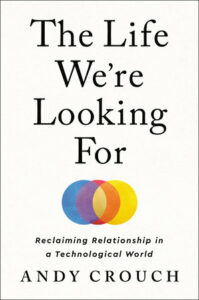 The Life We’re Looking For: Reclaiming Relationships in a Technological World Andy Crouch (Convergent) $25.00 OUR SALE PRICE = $20.00
The Life We’re Looking For: Reclaiming Relationships in a Technological World Andy Crouch (Convergent) $25.00 OUR SALE PRICE = $20.00
Andy is an elegant and careful writer, always offering interesting insights that set him above most authors of what I might call profoundly Christian cultural studies. But the genre of “cultural studies” doesn’t exactly capture the nature of his work which is notably personal as well. For instance, his book (one of my all time favorites) Culture-Making is about the human vocation to make things, to shape culture, to better the world —“recovering our creative calling” as the subtitle puts — so while it is in some ways about culture, informed by remarkable Bible study and a uniquely Christian world and life viewpoint, it isn’t essentially cultural criticism or social analysis; it is an invitation to a better way of life in and for the world.
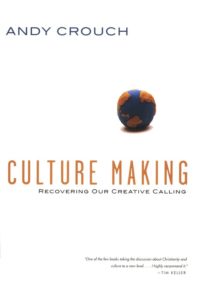 It’s the same with his exceptionally important book on using power, Playing God: Redeeming the Gift of Power where he makes an impeccable case that, like other things in God’s good but fallen world, institutions and organizations and influential leadership (that is to say authority and power) can be misused but, with great intentionality and care and prayerful innovation, can be exercised with grace and justice. His third small but very popular work is called Strong and Weak: Embracing a Life of Love, Risk and True Flourishing and it is a coda or afterword (or so I like to think of it) to these first two manifestos. He loves his 2 x 2 charts and shows
It’s the same with his exceptionally important book on using power, Playing God: Redeeming the Gift of Power where he makes an impeccable case that, like other things in God’s good but fallen world, institutions and organizations and influential leadership (that is to say authority and power) can be misused but, with great intentionality and care and prayerful innovation, can be exercised with grace and justice. His third small but very popular work is called Strong and Weak: Embracing a Life of Love, Risk and True Flourishing and it is a coda or afterword (or so I like to think of it) to these first two manifestos. He loves his 2 x 2 charts and shows 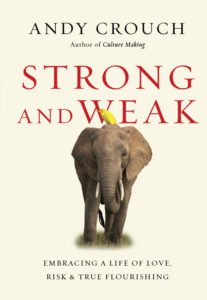 how we are most alive and faithful when we are “up and to the right” square, embracing this paradox of living out reasonable risk, willingness to suffer, and yet exercising our gifts and influence. It doesn’t suggest a medium halfway point between demoralizing suffering and self-righteous power, but a radical blend of weakness and strength, vulnerability and agency. Again, it is wondrously written, keenly perceptive about society and cultural dynamics, but yet is a very practical book for ordinary, educated people wanting to deepen their discipleship with human and humane ways of leaning into life.
how we are most alive and faithful when we are “up and to the right” square, embracing this paradox of living out reasonable risk, willingness to suffer, and yet exercising our gifts and influence. It doesn’t suggest a medium halfway point between demoralizing suffering and self-righteous power, but a radical blend of weakness and strength, vulnerability and agency. Again, it is wondrously written, keenly perceptive about society and cultural dynamics, but yet is a very practical book for ordinary, educated people wanting to deepen their discipleship with human and humane ways of leaning into life.
The Life We’re Looking For is brand new and after a lovely season of writing a very small and practical book about using smartphones and computers well in a family setting, Crouch has returned to offer another major work. It comes to us in a slightly trim-sized hardback so even though it is 226 pages (including the intriguingly exquisite footnotes) it isn’t too long or hefty. It is mature and stimulating in his most gracefully crafted style yet. Tech scholar Sherry Turtle of MIT raves about it, calling it a “personal meditation” written with “warmth and erudition.” That’s what I was trying to say!
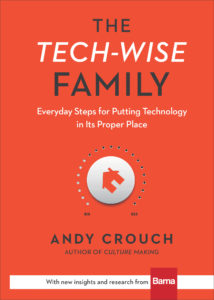 Already in the pocket sized Tech Wise Family Crouch explored what it does to us when we are shaped — our habits, our inclinations, our desires, our sense of how the world is to work — by our devices. (He doesn’t note James K.A. Smith’s notion of “secular liturgies” in the new one but he surely could have.) The Life We’re Looking For goes a lot deeper and in different directions than Tech-Wise, inviting us to reflect on the meaning of being human, the importance of being made in God’s image, and how to exercise our capacities (even drawing on self-help neurological studies about “flow” and the like.) He is trying to consider what we really want — what Tish Warren in her back cover comments calls “the most vulnerable longings of the human heart.” He knows that we have a primal need to be seen, to be “embedded in rich relationships.”
Already in the pocket sized Tech Wise Family Crouch explored what it does to us when we are shaped — our habits, our inclinations, our desires, our sense of how the world is to work — by our devices. (He doesn’t note James K.A. Smith’s notion of “secular liturgies” in the new one but he surely could have.) The Life We’re Looking For goes a lot deeper and in different directions than Tech-Wise, inviting us to reflect on the meaning of being human, the importance of being made in God’s image, and how to exercise our capacities (even drawing on self-help neurological studies about “flow” and the like.) He is trying to consider what we really want — what Tish Warren in her back cover comments calls “the most vulnerable longings of the human heart.” He knows that we have a primal need to be seen, to be “embedded in rich relationships.”
As we all know, one-click ordering from faceless corporations, is designed to be seamlessly smooth and very efficient. And, as we should know, these algorithms and bureaucracies are damaging us, eroding community fabric and molding our attitudes. His brief rumination on not knowing the UPS and other delivery drivers in his neighborhood anymore, since Amazon has gig workers is telling.
Do we really want this shallow connection; quantity over quality? Do we want devices to make everything easy (even if they could) as we become consumers, but less adept at using our bodies, playing instruments, cooking our own food? Do we want to be tethered to multi-tasking and regularly speed-speed-speed through increasingly impersonal environments? Do we want rugged individualism or do we long for communities of care, extended households, even? Andy’s chapters on the formation of such households — a countercultural move to subvert the individualism and even loneliness brought on by technocracy — were simple and radical and moved me to tears.
If you read my BookNotes reviews a day or so ago you will recall my highlighting the work of Brian and Sylvia Walsh in their Russett House homestead and their seriously Biblical engagement with the likes of Wendell Berry; many of the tribute chapters in A Sort of Homecoming in honor of Brian would resonate well with Crouch’s The Life We’re Looking For. Similarly, I reviewed a new book called Practicing the Kingdom about the life and books of Christine Pohl (Making Room and Living in Community, among others) which, again, would be excellent to read alongside Crouch’s new one.
In an otherwise very positive review in Publisher’s Weekly they worried that The Life We’re Looking For was uneven, and I sort of understand why — Crouch covers a lot of ground. There are sections which include a bit on the history of technology, a look at alchemy (with a nod to Harry Potter), a good bit on artificial intelligence and “boring robots”, a powerful reflection on money/Mammon and nature of capitalism, his wife’s use of instruments in her scientific research, and an admitted excursion in what calls an “intermission” on a very moving story from the New Testament as a remarkable reminder of the early church’s presence within first-century Roman Empire. (I couldn’t help but think of Walsh & Keesmaat’s Romans Disarmed in that party the way.) All of that, and more, could be seen as tangents, but, trust me: they are not. The chapters weave together and reward the patient reader as connections are made and insights circle back and layer on one another, bit by bit. We all know these are confusing and contradictory times (“we love it, we hate it, ain’t that life?” the late, great Mark Heard sung so powerfully in “Nod Over Coffee.”) Andy’s book helps us navigate in healthy and even beautiful ways, the tensions and trade-offs of these days.
Especially if you are familiar with his other terrific books, I don’t have to say much more about this. I think you will be delightfully surprised at how easily (but yet uniquely) he builds a case about recognition and what we seem to be “wired for.” (Now there’s a metaphor emerging from our times, eh? I suspect he may not approve — he kindly warns us against using words unthinkingly, such as his commends on the ubiquity of the word “impact” (as a verb) and that page is worth the price of the book, even if somewhat of an aside It is, by the way, impactful.)
To glean the evocative style and deep wisdom of this book, ponder (and be enticed) by just a few of twelve chapter titles, paying close attention to the helpful subtitles:
- The Superpower Zone: How We Trade Personhood for Effortless Power
- Modern Magic: The Ancient Roots of Our Tech Obsessions
- From Devices to Instruments: Truly Personal Technology
None of this is bombastic or heavy-handed (as passionately concerned as he obviously is.) The book is not overly polemical nor alarmist. It is often gentle, even a bit quiet, in a way that seems proper for the human-scale ecology he is inviting us into. In a chapter called “From Charmed to Blessed” he tells a story that you will long remember as he calls us to “the community of the unuseful.” In the telling about our New Testament friend Gaius and the odd, diverse community under Roman rule of which he was a part, he describes them as “fragile.” He follows that with reflections on own ancestry and I found it very tender.
This lovely, thoughtful book offers plenty of well-researched information and teaches us much, even a bit, as we’ve noted, on AI and computer science, which is enlivened when he mentions his Roomba and how he sneakily alludes to a dishwasher as a computer. He observes a bit about how our the human-scale texture of our lives when we give ourselves over to automation. (Which is, by the way, one of the reasons we always reply with a personal note acknowledging orders here on line, trying in our small way to redeem the online buying experience, inefficient as that may seem.) Naturally, the book includes poignant stories (and some fun ones, for instance about his own bike riding habits and his driving habits as well.) In the second portion, Crouch offers “redemptive moves” — new postures and habits to “help us begin, right now, to live more fully human lives.” I am convinced that it just might. I am sure reading it will help us cope with — you’ll have to read it to get the full irony — “the loneliness of a personalized world.”
As he says early on, on page 18:
We do not have to accept our technology’s default settings — they can be adapted, and eventually redesigned, to serve a new and better set of purposes.
As Andy so nicely invites us to move away from “ever-increasing isolation” and create homes “that become creative centers far more consequential than the refuges of consumption and leisure have let them become” he also pushes unto include the outcast, the unwell, the unproductive, the overlooked.
And he is hopeful:
The great news is that there are already examples of these redemptive moves — some seedlings, some saplings, some beginning to bear widespread fruit — and we all have a part to play in helping them grow.
Quiet and reflective as it may be, finally, again, The Life We’re Looking For: Reclaiming Relationships in a Technological World is not a gentleman’s armchair treatise. It is a reformational manifesto, calling us to renewal, change, redemptive efforts, to become agents of the shalom God wills for us all. Or at least a bit more sane in this fast-paced, digital world. It is a wise and wonderful book.
Alan Jacobs is one of the prominent essayists of our time, and knows a thing or two about the implications of our shift to machines in the middle of modernity. (Read his spectacular Year of Our Lord: 1943 for a particularly in-depth study of what five important Christian thinkers were thinking about these very things.) Here he says this is Andy’s best book yet:
The Life We’re Looking For is, and this is saying something, Andy Crouch’s best book: a deeply moving meditation on the human need to find true personhood, which means, among other things, to know as we are known. Strong and cogent critiques of Mammon’s empire–which, as Crouch shows, is where we live–are not unheard of, but a book that goes this deeply into the heart of things, into the heart of God, is a pearl of great price. — Alan Jacobs, author of How to Think and Breaking Bread with the Dead
Listen to Tish Harrison Warren, who writes so well about so much herself:
As I read this breathtaking book, I was surprised to find myself tearing up often, not because it is a book about tragedy or loss, but because Andy Crouch, perhaps more than any other writer of our day, perceives and names the deepest and most vulnerable longings of the human heart. The Life We’re Looking For describes the confusion and contradictions of our cultural moment in clear and resonant ways and, more important, offers hope that we might find a beautiful way of living amidst them. –Tish Harrison Warren, author of Liturgy of the Ordinary and Prayer in the Night
 Agents of Flourishing: Pursuing Shalom in Every Corner of Society Amy L. Sherman (IVP / Praxis) $26.00 OUR SALE PRICE = $20.80
Agents of Flourishing: Pursuing Shalom in Every Corner of Society Amy L. Sherman (IVP / Praxis) $26.00 OUR SALE PRICE = $20.80
Again, this strikes me as just one of those wonderful, wonderful, nonfiction reads that is nearly everyone might want in a book like this. It is well written, clear-headed, exceptionally well-informed, full of solid data and lots of interviews which translates into motivational stories and inspiring case studies. It is very theologically informed — neither eccentric or stuffy, I would say it is creatively generous and solidly orthodox. There are footnotes galore and even though it weighs in at a heft 340 pages, it is a delight. (Truth be told, I haven’t finished it yet, and some of it needs to be not only savored but worked on a bit, considered. So it is going to take a while.)
I am not being the least bit snarky when I say the title alone pushes all my buttons — in a good way! Increasingly, many of those we admire most who are contributing to the conversations about the missional church and Kingdom visions and whole-life discipleship and cultural reformation and wholistic social renewal are using the notion of flourishing. It is useful as it draws on and points to the multi-dimensional Biblical vision of shalom (without being, well, a Hebrew word that is mostly used by old hippy peaceniks like me.) I love that she uses the word agents, which conjures up 2 Corinthians 5 and the high calling of being used by God to accomplish cosmic reconciliation. “Every corner” almost sounds like Abraham Kuyper’s “every square inch” of creation being claimed by the Lord Jesus; for those who are most rigorously missional (and Sherman is one of them, drawing, for what it’s worth, on Leslie Newbigin and Michael Goheen and Kuyper himself) there are no square inches or corners of this world that God doesn’t not care about; there is no primordial dualism between the sacred zones and the so-called secular areas. Christ’s Kingdom is renewing and restoring all human life and every aspect or sphere of society. So, I appreciate the winsome and freighted title and love the agenda of this major volume. The always energetic Reggie McNeal (author of Kingdom Come and currently a city coach with GoodCites) says is a “masterful tome…for those who want to get in on what God is up to.”
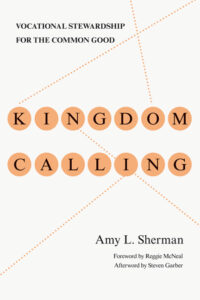 You may know Amy Sherman (who has a PhD in international economic development and lived in the developing world for a while) from her masterful and brilliant survey of various ways practitioners can think about and deepen their own sense of integrating faith and work, living out various vocations as they move from Sunday liturgy to Monday labor. (That wonderful resource is Kingdom Calling: Vocational Stewardship for the Common Good and incomes with a vital introduction by Reggie McNeal and a splendidly written afterward by Steve Garber; perhaps not the first book for those reading about calling and vocation, work and career, but certainly one of the most important.)
You may know Amy Sherman (who has a PhD in international economic development and lived in the developing world for a while) from her masterful and brilliant survey of various ways practitioners can think about and deepen their own sense of integrating faith and work, living out various vocations as they move from Sunday liturgy to Monday labor. (That wonderful resource is Kingdom Calling: Vocational Stewardship for the Common Good and incomes with a vital introduction by Reggie McNeal and a splendidly written afterward by Steve Garber; perhaps not the first book for those reading about calling and vocation, work and career, but certainly one of the most important.)
Maybe you know her for her lovely chapter she graced us with in the book I edited about such things for college graduates, Serious Dreams: Bold Ideas for the Rest of Your Life. I have more than once told people to read her chapter first as it is one of the most lively and inspiring commencement addresses in the book, first delivered at Malone College in Ohio. Like her Kingdom Calling book, she reflects on Proverbs 11:10, asking why a community would rejoice (as the Proverbs says they will) when the righteous prosper. Obviously, these are the not the wealthy rich who are extracting wealth from a community, faceless Amazonians making billions while local neighborhoods suffer and local infrastructure is abused. No, if the community is rejoicing because some are prospering, those prospering must be doing so with integrity, as partners with the local community, embedded in economies of mutuality. It’s a great little speech inviting graduating students to take up jobs in the world that reflect this kind of commitment to community empowerment and genuine human flourishing.
So, we respect and enjoy Amy who is so appreciated everywhere she goes. And this book is, I’d say (even though she has published with the world-class Oxford University Press, and, well, that Square Halo one that Borger edited) the best book she has yet one. Wow.
Here are four things you should know about the benefits of Agents of Flourishing:Pursuing Shalom in Every Corner of Society.
Firstly, although it obviously can be and should be read by any educated person who cares about developing a faith-based and balanced, Biblically-inspired view of society and culture (that is not motivated by culture wars animosity from the Christian right nor primarily about social justice issues from the left), it seems to be aimed firstly at pastors or Christian leaders or parachurch agencies or street level urban activists who are eager to deepen their involvement or get good guidance about their involvement in wholistic ministries for the common good. It is not only for pastors, but pastors should read it.
It has been our experience that clergy are not the primary readers of the many provocative and cutting edge books we sell about the missional church. It is remarkable to me how many sharp congregants and social entrepreneurs and Christian citizens who just care about their city or town (and maybe are agitating their local parish to be more involved) read the standard books about missional engagement and intregal mission. I suppose it makes sense that the chair of a local mission committee wants to read about neighborhood outreach in ways that busy pastors may not have time to do. Still, this book is important for clergy, I think. That it was published by IVP in their Praxis line (about congregational life) in partnership with the great organization Made to Flourish speaks volumes given that MtF (founded by Tom Nelson, himself an author of a book on work and another book on how churches can help local economic development) exits to encourage and equip pastors to lead well in these Biblically-based missions for the common good, helping congregants serve God as Kingdom salt and light wherever they find themselves outside the walls of the church.
Secondly, Agents of Flourishing: Pursuing Shalom…, while clear about the many reasons for community ministry, doesn’t rehash what has been said in many ways by many authors and activists. It does root its overall vision in sturdy insights from church history, making a case that churches of various sorts in many times and places have nearly always agreed that wholistic, caring, outreach, including even efforts for structural change and institutional reform, has been intregal to their gospel witness. She shows how she stands on the shoulders of others without repeating the obvious. Helpfully, though, she shows how this impulse for wholistic mission aimed at cultural reformation and social improvement — for normative, wholesome flourishing and all that that implies — can be updated and applied in fresh ways in our 21st century North American contexts. Call it ancient-future if you wish, but she has an expert and clear-headed awareness of the best ideas and practices of the past as they may inform our very contemporary, even post Christian, postmodern times.
Thirdly, one of the things that makes Agents of Flourishing very interesting and exceptionally helpful for anyone wondering how to begin or tweak or sustain their work of common grace for the common good is that it is partially based upon goodly amounts of interviews Sherman did with all kind of folks in various places who are doing good and lasting work. (I gather some of these are folks she has worked with through Made to Flourish or her own think-tank, the Sagamore Institute and their Center on Faith in Communities.) These are not sweet but quick allusions to fly-by-night inspiration episodes, but come from detailed interviews and studies of admirable, thoughtful projects that have lasting influence. She knows the research and data and she knows the streets and agencies and missional endeavors, so she knows to asks about assets and goals and obstacles and funding and and faith and all kinds urgent matters that are instructional for readers. In this regard, it does even better what she did in her popular book from nearly two decades ago, Restorers of Hope which offered well researched case studies of those reaching the poor with “church based ministries that work.”
Just for instance, she spends some time reporting on a small cadre of folks at a CRC congregation in Grand Rapids (Church of the Servant) that has done some good study of “mass incarceration” and injustices in the criminal justice system. (Oh, the painful irony that as I type this, that city is reeling from what seems to be yet another horrific shooting of an unarmed black man by a white policeman.) Perhaps this makes it that much more poignant to read, and good, knowing that there have been relational, social, and civic networks development around prison reform and multi-faceted ministry among those who are imprisoned (and those getting out of jail, needing support, looking for work, etc.)
That is only one case study among many exploring what we can learn from those who have been at spiritually-based, culturally-savvy, and institutionally-committed projects that help the Kingdom of God break in just a little bit in a given locale. Each could inspire you to some sort of new venture, perhaps, but I believe the value is more learning about the process and procedures, the translation of vision to action and sustainable cultural renewal. We can learn much from each of the case studies regardless of your specific interest in their unique, particular social ministry innovation. There is a lot of shalom being shared in a lot of corners. Agents of Flourishing introduces you to so much, networks you in waist help you march on.
Fourthly, you will love the wonderful way the book is arranged (and her suggestions about how to use it if you want to skip around a bit or focus on the most germane parts for you and your group.) She has these chapters that I might call visionary followed by two more application chapters offering strategies and examples moving towards implementation of that value or virtue. The visionary chapters include considerations of the true, the good, the beautiful, the just and well ordered, the prosperous, and the sustainable. Fascinating. Solid. Well-developed.
To recap: Ms. Sherman has developed this resource primarily for pastors, clergy, missional activists, local mission committees and neighborhood leaders. It is not merely saying what has been said before about why we must serve the poor or resist social injustice or work for racial reconciliation; it offers, instead, theological grounding and direction based on ancient faith and church history, making connections between the past and the present. And it is full of stories, thoughtful, carefully evaluated and presented case studies from lots of folks doing lots of good work. These educational stories bring practical weight to the visionary values she extols, dreaming, as she does, dreams of goodness, truth, beauty, justice, sustainability, and the like.
In the very beginning of the book Amy generously affirms and shares how she loves seeing the “seek the peace [or welfare] of the city” verse from Jeremiah 29 emblazoned on banners and mission statements and newsletters and church buildings and community centers. I recall preaching on that text decades ago when one might assume that the audience would be taken with it, not having heard it before. I still get fired up speaking about that text. In many circles, though, it has become a go-to verse, cited often, and commonly preached (well or not so well). She shows none of my “been there, done that” bad attitude and has no “it’s about time” tone. She relishes what God is going in the world, glad to know about what is increasingly happening in churches large and small, in cities and small towns. She notes how that verse given to God’s people while in hostile exile centuries ago has resonated with many believers lately here in what sometimes feels like a bit of our own Babylonian exile.
Yet, she realizes (and if you are honest, you most likely do, too) that there is often a bit of a gap between our vision and our action. Either we talk a good game but don’t do much, or, more likely, we do what we can in sporadic and ad hoc ways, not particularly purpose-driven, not particularly strategic about long-term public health and wellness, which is to say, not exactly agents of genuine, sustainable flourishing. We might be putting band-aids on wounds, putting out fires, loving our neighbors the best we can without much serious consideration of best-practices and lasting transformation or even the qualities of good neighborhood and a flourishing city. This book is a clear roadmap out of that pattern, a plan for reducing the gap between good talk, good intentions, but ineffective strategies.
When history looks back on the church in America at the start of the twenty-first century, it won’t be a pretty sight. Division, scandals, unbelief, materialism, individualism, theological drift . . . the list goes on and on. We’ve simply lost our way. Fortunately, this latest work by Dr. Amy Sherman provides a road map to help us get back on track. Amy rightly focuses our attention on the central message of Jesus–the good news of the kingdom of God (Luke 4:43)–and provides readers with helpful prompts to improvise this story in their cities and neighborhoods. Miraculously, we are to do this–not by exercising worldly power but from a posture of humility, grace, and sacrificial love. This is the way of King Jesus, and it needs to be the way of the church once again. — Brian Fikkert, president and founder of the Chalmers Center, coauthor of When Helping Hurts: How to Alleviate Poverty Without Hurting the Poor
The flourishing of the whole creation, including the entire life of humanity, is the purpose and intention of a good and generous God. Our sin has corrupted and polluted every aspect of creation leading to curse instead of blessing, but one day God will restore that blessing fully. Until then we are called to be agents of God’s original intention. Sherman has offered a wonderful blueprint for what that flourishing might look like in our time. What I really laud is her attention to the rich creational diversity of human flourishing–marriage, justice, art, education, business, and more. In a time when idolatry is destroying the witness of the church in America, these words are welcome and timely. — Michael W. Goheen, professor of missional theology at Covenant Theological Seminary and author of The Church and Its Vocation: Lesslie Newbigin’s Missionary Ecclesiology
Both of these books are available for shipping and both qualify for our 20% off BookNotes discount. You can easily order by clicking on the tab below — or call, if you’d rather.


+++
TO PLACE AN ORDER
PLEASE READ THESE REMINDERS AND THEN CLICK ON THE “ORDER” LINK BELOW.
It is helpful if you would tell us how you prefer us to ship your orders. The weight and destination of your package varies but you can use this as a general guide.
There are generally two kinds of US Mail options, and, of course, UPS. If necessary, we can do overnight and other expedited methods, too. Just ask.
- United States Postal Service has the option called “Media Mail” which is cheapest but can be slow. For one typical book, usually, it’s about $3.50.
- United States Postal Service has another option called “Priority Mail” which is $8.35 if it fits in a flat rate envelope. Many children’s books and some Bibles are oversized so that might take the next size up which is $8.95. “Priority Mail” gets much more attention than does “Media Mail” and is often just a few days to anywhere in the US.
- UPS Ground is reliable but varies by weight and distance and may take longer than USPS. We’re happy to figure out your options for you once we know what you want.
– DON’T FORGET TO LET US KNOW WHAT SHIPPING METHOD YOU PREFER –
BookNotes
SPECIAL
DISCOUNT
20% OFF
ALL BOOKS MENTIONED
+++
order here
this takes you to the secure Hearts & Minds order form page
just tell us what you want to order
inquire here
if you have questions or need more information
just ask us what you want to know
Hearts & Minds 234 East Main Street Dallastown PA 17313
read@heartsandmindsbooks.com
717-246-3333
It is complicated for us, but we are still closed for in-store browsing due to our commitment to public health (not to mention the safety of our staff and customers.) The vaccination rate here in York County is sadly lower than average and the new variant is now spreading. Our store is a bit cramped without top-notch ventilation so we are trying to be wise and faithful.
Please, wherever you are, do your best to be sensitive to those who are most at risk. Many of our friends, neighbors, co-workers, congregants, and family members may need to be protected since more than half of Americans (it seems) have medical reasons to worry about longer hazards from even seemingly mild Covid infections.
We are doing our famous curb-side customer service and can show any number of items to you if you call us from our back parking lot. We are eager to serve and grateful for your patience as we all work to mitigate the pandemic.
Of course, we’re happy to ship books anywhere. Just tell us how you want them sent.
We are here 10:00 – 6:00 EST / Monday – Saturday, closed on Sunday.

